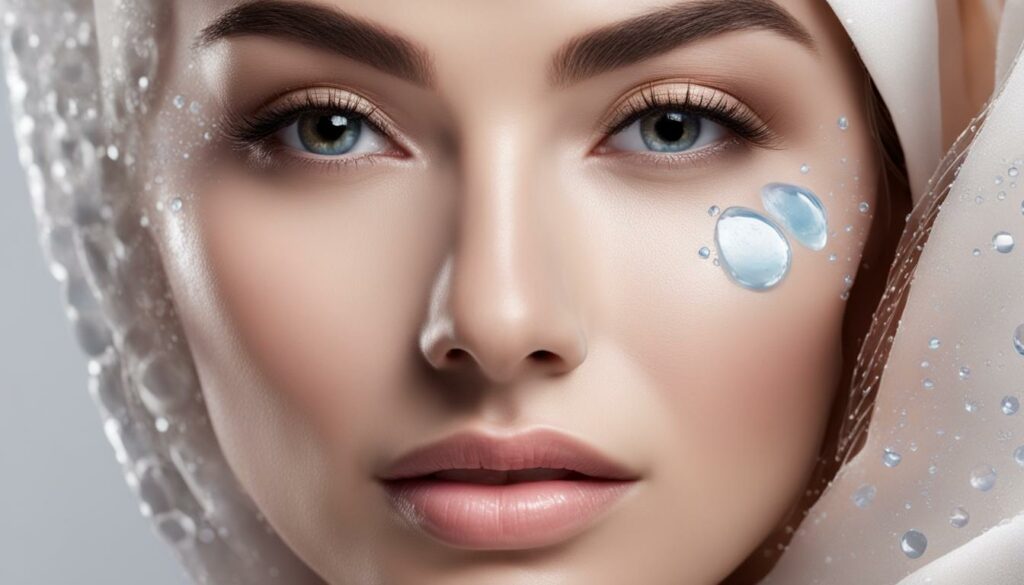
Are you tired of dealing with crepey skin that makes you look older than you feel? If so, you’re not alone. Many people struggle with the appearance of crepey skin, which is characterized by thin, wrinkled, and sagging skin. But don’t despair! There is hope for improving the look of your skin, and it starts with the right vitamin.
Key Takeaways:
- Vitamin C can help improve the appearance of crepey skin by stimulating collagen production
- Other vitamins, such as vitamin E, vitamin A, vitamin D, and vitamin K, can also support skin elasticity and firmness
- A nutrient-filled diet is crucial for healthy aging and skin health
- Anti-aging supplements may have potential benefits, but their effectiveness is still being researched
- When buying anti-aging supplements, look for third-party verification to ensure quality and purity
The Importance of a Nutrient-Filled Diet for Healthy Aging
A nutrient-filled diet plays a crucial role in maintaining healthy skin and promoting healthy aging. One of the key factors in maintaining youthful-looking skin is ensuring the intake of essential vitamins that support skin health. Let’s explore some of the best vitamins for aging skin, their benefits, and their food sources.
Best Vitamins for Aging Skin
1. Vitamin C: Vitamin C is known for its ability to stimulate collagen production, which can help reduce the appearance of wrinkles and promote skin elasticity. It also acts as an antioxidant, protecting the skin from free radicals that can cause damage. Foods rich in vitamin C include citrus fruits, berries, kiwi, broccoli, and bell peppers.
2. Vitamin E: Vitamin E is another powerful antioxidant that helps protect the skin from environmental damage. It also aids in maintaining the skin’s moisture and elasticity. Good sources of vitamin E include nuts, seeds, spinach, and avocados.
3. Vitamin A: Vitamin A is essential for skin cell regeneration and can help improve the appearance of fine lines and wrinkles. It is commonly found in orange and yellow fruits and vegetables, such as carrots, sweet potatoes, and mangoes.
4. Vitamin D: Vitamin D plays a role in skin cell growth and repair, and it may help reduce the risk of skin damage caused by the sun’s harmful UV rays. Natural sources of vitamin D include fatty fish like salmon, fortified dairy products, and sunlight exposure.
5. Vitamin K: Vitamin K is often associated with its role in blood clotting, but it also has benefits for the skin. It can help reduce the appearance of dark circles and bruises and promote skin healing. Leafy greens, such as kale and spinach, are excellent sources of vitamin K.
Anti-Aging Supplements and Their Effectiveness
When it comes to fighting the signs of aging, many people turn to anti-aging supplements in the hopes of achieving a more youthful appearance. But do these supplements really work? The effectiveness of anti-aging supplements, including vitamins, is still a topic of debate. While some supplements may have potential benefits for improving skin health, the science behind their effectiveness is lacking concrete evidence.
Dermatologists suggest that the best approach to address aging skin is to stick to a good skincare routine and a nutrient-filled diet. However, certain supplements, such as vitamin C, vitamin E, and antioxidant combinations, may offer some potential benefits for improving skin health. It is important to note that the effectiveness of these supplements can vary depending on individual factors such as age, overall health, and lifestyle habits.
“The overall effectiveness of anti-aging supplements is still being researched. It is important to prioritize a nutrient-filled diet, maintain a good skincare routine, and protect the skin from environmental damage through practices like using sunscreen.”
Before adding any supplements to your routine, it is recommended to talk to a healthcare professional, especially if you have underlying health conditions or if you are pregnant. They can provide personalized advice and guidance based on your specific needs and circumstances. Remember that supplementing with vitamins should never replace a balanced diet, which is the best way to ensure you are getting the necessary nutrients for healthy aging.
The Best Anti-Aging Supplements and Vitamins
While the overall effectiveness of anti-aging supplements is still debated, there are certain supplements and vitamins that have shown potential benefits for improving skin health. Here are some of the best options to consider:
- Vitamin C: Known for its antioxidant properties, vitamin C can help protect the skin from free radicals and promote collagen production, which can improve skin elasticity and reduce the appearance of wrinkles.
- Vitamin E: Another powerful antioxidant, vitamin E can help protect the skin from UV damage and improve overall skin health.
- Coenzyme Q10: This compound occurs naturally in the body and plays a key role in the production of collagen and elastin, which are essential for maintaining firm and youthful-looking skin.
- Resveratrol: Found in red wine, grapes, and some berries, resveratrol has been shown to have antioxidant and anti-inflammatory effects, which can help protect the skin from damage caused by aging and environmental factors.
While these supplements may offer potential benefits, it is important to remember that individual results may vary. It is always best to consult with a healthcare professional before starting any new supplement regimen to ensure it is safe and appropriate for your specific needs.
Tips for Buying Anti-Aging Supplements
When it comes to buying anti-aging supplements, it’s important to be an informed consumer and make choices that align with your skincare goals. Here are some tips to consider:
1. Look for Third-Party Verification
One of the key considerations when purchasing anti-aging supplements is to ensure that the product has undergone third-party verification. Look for labels like “GMP” (Good Manufacturing Practices) and “USP” (United States Pharmacopeia), which indicate that the product has been manufactured under quality and purity standards. Third-party organizations such as the National Science Foundation (NSF) and ConsumerLab.com also provide independent testing and certification.
2. Check the Ingredients
Take the time to read and understand the list of ingredients in the supplement. Look for key vitamins and antioxidants that are known to support skin health, such as vitamin C, vitamin E, and Coenzyme Q10. Avoid supplements that contain excessive amounts of fillers or artificial additives.
3. Consider the Form and Dosage
Supplements come in various forms, including capsules, tablets, powders, and liquids. Choose a form that is convenient for you to take and suits your preferences. Additionally, pay attention to the recommended dosage and follow the instructions provided by the manufacturer or healthcare professional.
4. Research the Brand and Manufacturer
Before purchasing any anti-aging supplement, do some research on the brand and manufacturer. Look for reputable companies with a track record of producing high-quality products. Check customer reviews and testimonials to get a sense of the product’s effectiveness and trustworthiness.
Remember, it’s always a good idea to consult with a healthcare professional or dermatologist before adding any supplements to your routine. They can provide personalized advice based on your specific needs and help you make informed decisions about the best supplements for your anti-aging goals.

Conclusion
In conclusion, addressing the concerns of crepey skin requires a holistic approach. While there is evidence to suggest that certain vitamins, such as vitamin C, can have beneficial effects on skin health and appearance, the overall effectiveness of anti-aging supplements is still being studied. It is important to prioritize a nutrient-filled diet that includes foods rich in vitamins like vitamin C, vitamin E, vitamin A, vitamin D, and vitamin K.
Additionally, maintaining a good skincare routine, protecting the skin from environmental damage with practices like using sunscreen, and considering other methods like topical vitamin C treatments or hyaluronic acid can also contribute to improving skin health.
However, it is crucial to consult a healthcare professional or dermatologist before incorporating supplements or trying new skincare methods, as everyone’s skin is unique, and individual reactions may vary. By taking a comprehensive approach and seeking expert guidance, you can make informed decisions that best suit your skin’s needs and achieve healthier, more vibrant-looking skin over time.
FAQ
What vitamin is beneficial for improving crepey skin?
Vitamin C has been found to be beneficial for improving the appearance of crepey skin. It stimulates collagen production, which helps reduce fine lines and improve skin texture. Vitamin C also acts as a potent antioxidant, neutralizing free radicals and preventing abnormal pigmentation.
What other vitamins support skin elasticity and firmness?
Other vitamins that can support skin elasticity and firmness include vitamin E, vitamin A, vitamin D, and vitamin K.
Can these vitamins be obtained through diet?
Yes, these vitamins can be obtained through a nutrient-filled diet, which includes fruits, vegetables, nuts, seeds, and fortified foods.
Do oral supplements effectively improve skin aging?
The effectiveness of oral supplements in improving skin aging is still being researched. However, a nutrient-filled diet can result in more supple skin.
Are anti-aging supplements and vitamins effective?
The effectiveness of anti-aging supplements, including vitamins, is still a topic of debate. Dermatologists suggest that maintaining a good skincare routine and a nutrient-filled diet is the best approach to address aging skin.
How can I ensure the quality of anti-aging supplements?
When buying anti-aging supplements, it is important to look for third-party verification. Checking for labels such as “GMP” and “USP” indicates that the product adheres to quality and purity standards. Third-party organizations like the National Science Foundation (NSF) and ConsumerLab.com also provide a level of certainty in verifying the effectiveness of supplements.
What other methods can help improve skin health?
In addition to using supplements and maintaining a nutrient-filled diet, other methods that can help improve skin health include topical vitamin C treatments, hyaluronic acid for hydration, and chemical peels performed by dermatologists.
Is it necessary to consult a healthcare professional before trying these methods?
Yes, it is important to consult a healthcare professional or dermatologist before trying any new skincare methods or adding supplements to your routine.
What is the overall approach for addressing crepey skin?
Taking care of your skin and addressing concerns like crepey skin requires a multi-faceted approach. Prioritizing a nutrient-filled diet, maintaining a good skincare routine, and protecting the skin from environmental damage through practices like using sunscreen are essential steps. Consulting a healthcare professional or dermatologist is highly recommended.



